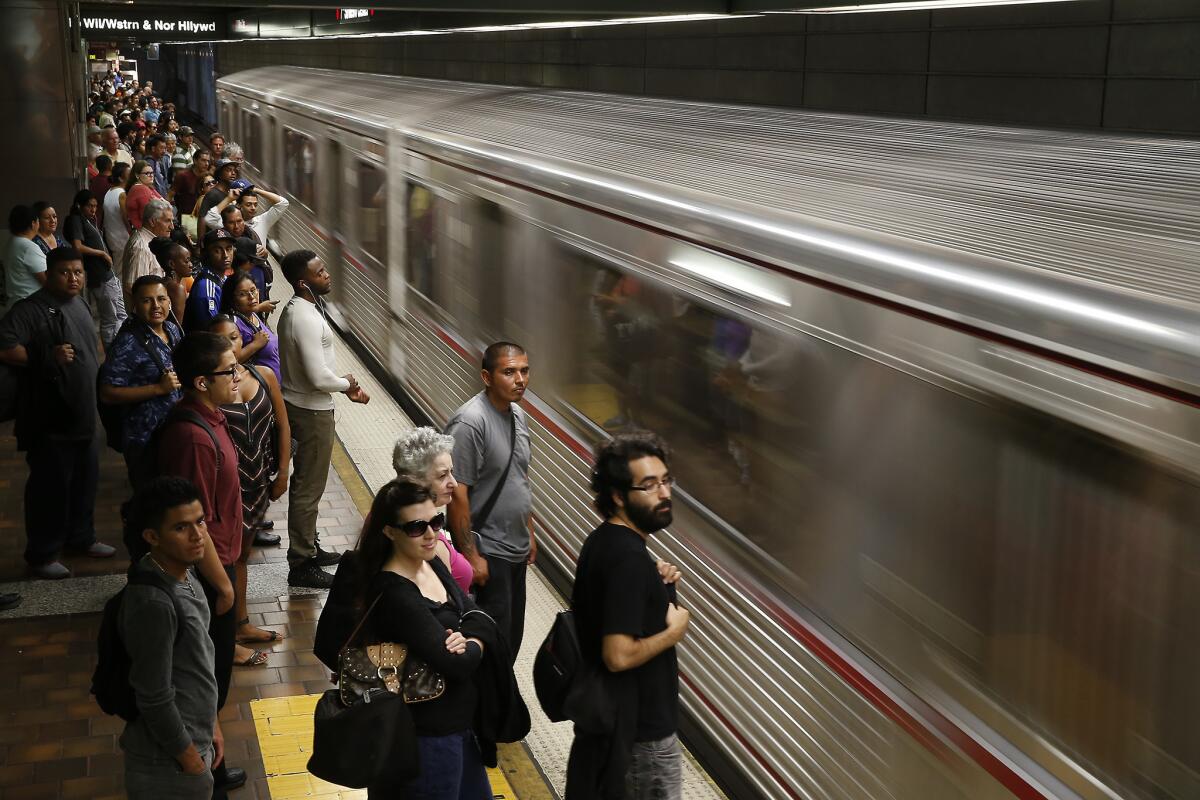To engage with a stranger or not? Readers weigh in

- Share via
I expected to be scolded after Saturday’s column on my encounter with an unkempt, overly friendly man I’d allowed to draw me into a hug one night at a downtown subway station.
I was ambivalent about my response to his overture of friendship — if that’s even what it was. Had I offered compassion or acted like a fool?
The response from readers did not allay my confusion:
Some expressed concern for my safety and questioned my choice. I was called naive, a nitwit, not just reckless but nuts. Others shared similar stories of split-second choices that might have seemed foolhardy, but left them feeling good.
I didn’t expect to hear from so many people who’ve wrestled with similar existential dilemmas. Like me, they’ve tried to weigh the risk and responsibility of engaging with strangers who asked for money, expected conversation or invaded their personal space.
They have soul-searched and second-guessed. Many are troubled by their own inaction or unease.
“My husband and I consider ourselves to be good stewards toward various disadvantaged segments of the world. But we can be a bit distant in public encounters,” wrote Scott Smissen, bemoaning his failure to donate to a man he had passed near a freeway offramp in Sherman Oaks.
I can’t fault him: Traffic was heavy, he had errands to run and only a few dollars in his wallet.
But sitting in his expensive car, he’d seen the man washing up in the brush behind a hand-lettered sign that read “lost my job, humiliated, just need some help. thanks.”
Witnessing that private gesture, he said, created a bond that driving off seemed to violate.
Smissen finished his errands, got cash from the bank and circled back to the offramp, but the man had moved on. “My lapse of not going back immediately, even with the $2 I had, haunts me now,” he said. “I weep as I write this.”
Some might consider that sappy. I consider it heartening.
We live in a region that makes it easy not to mingle. But that hasn’t squelched our innate need to reach out and connect.
::
There are reams of research on what influences us to trust and offer help to people we don’t know. I see these three elements in my experiences and in the stories strangers shared:
• We recognize the person as part of our group. That doesn’t mean just age, race or gender; other qualities can strike familiar chords. For me, that might mean single moms or anyone carrying a book.
• We’ve lived with enough diversity to mute social biases that reduce unfamiliar people to scary stereotypes.
• We’re forced to spend fixed time with a stranger in a public spot, like a subway station or the cosmetics aisle at Target.
That’s where Laurie Tragen-Boykoff had to decide whether to lean in or run off.
She and a young woman were browsing when they locked eyes. Tragen-Boykoff smiled and looked away. The woman walked toward her and asked for a hug.
“In an instant, all the same thoughts you had rushed through my head: Is she mentally ill? Will she grab my purse and run? Will she stab me?” Tragen-Boykoff wrote.
She opened her arms to the forlorn-looking woman and they shared a hug. The woman confided to Tragen-Boykoff that she’d been laid low by a breakup with her boyfriend. “She thanked me for my willingness to pause in my day,” she wrote.
“The exchange touched my heart, and I was grateful for taking a small leap of faith.”
::
For many readers who thought I was unwise to let a stranger hug me, gender was the sticking point.
“I think that man invaded your space and was disrespectful to you,” wrote Stina Pederson. “You were reading the paper and that should have been an indication … that you didn’t want to engage in conversation.”
That’s from a woman sensitive enough to worry that she had hurt the feelings of stranger who tried to make small talk at a downtown bus stop. Pederson recalled that she’d been busy writing in her journal, so she nodded, crossed her legs and turned away.
Then, she said, she “felt kind of bad about the encounter for the rest of the day.”
Other readers felt no such ambivalence.
“No decent man is going to approach a woman alone in a train station,” wrote a woman who enrolled in a self-defense class after her purse was snatched by a young man her gut had told her not to trust.
Another woman admired my “openness” and admitted that she and a friend had been unnerved by a late-night subway ride to Long Beach from a Disney Hall symphony performance.
“We entered the underground station and the only ones there were a small clutch of men — none of them looking like the kind of men I live my normal life around. And of course we got the look-over from all of them. … That was the end of taking the train at night to L.A.”
Is fear squashing her adventurous spirit? Or is she wise to let caution be her guide?
It’s hard to say in Los Angeles, a city where we’re not used to rubbing elbows with people who aren’t like us.
I’d say Torrance reader Cal Anton put it best: “It’s a very delicate balance of your own safety and wanting to reach out and show that you still have faith in humanity. … All we can do on a grand scale is be careful and hope our instincts are good.”
sandy.banks@latimes.com
Twitter: @SandyBanksLAT
More to Read
Sign up for Essential California
The most important California stories and recommendations in your inbox every morning.
You may occasionally receive promotional content from the Los Angeles Times.














